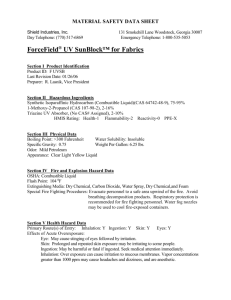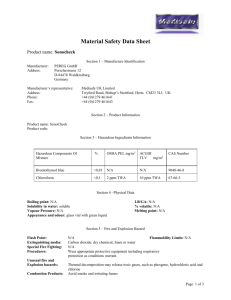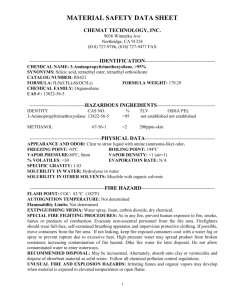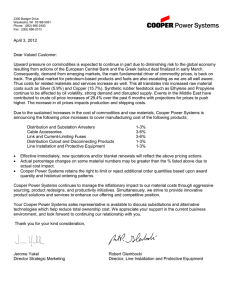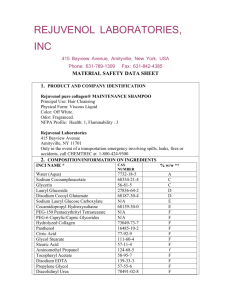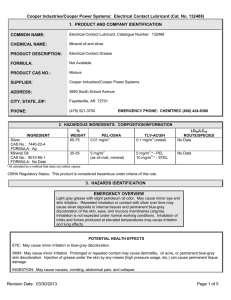Cooper Industries/Cooper Power Systems: Fiberglass Cleaner/Wax (Cat. No. 131840)
advertisement
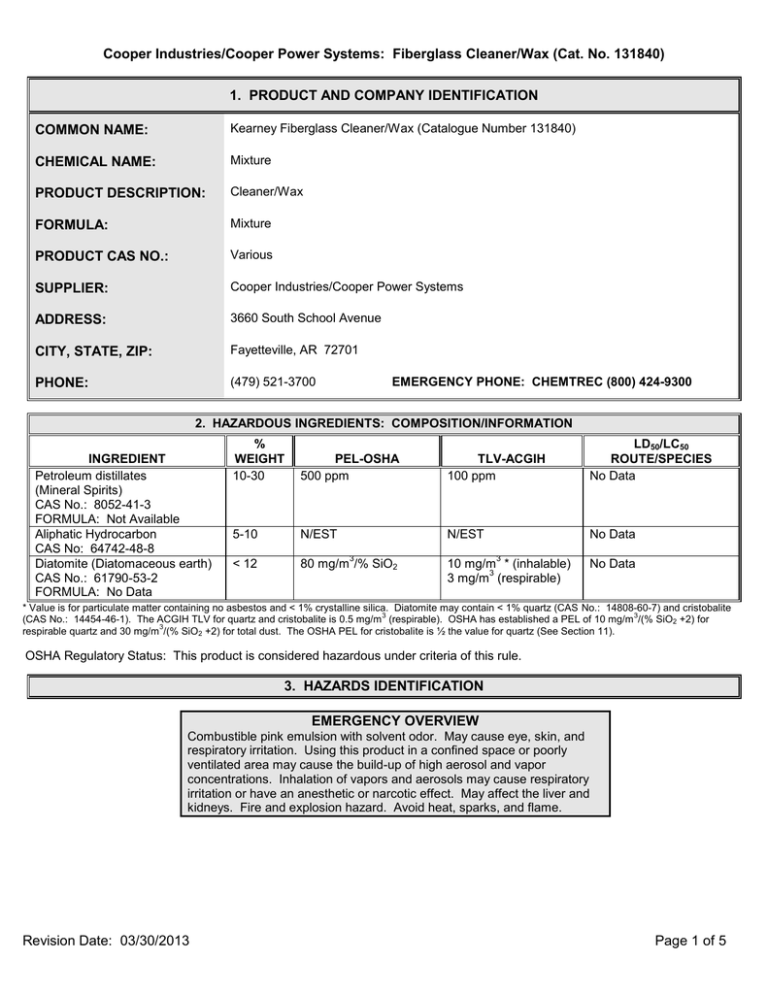
Cooper Industries/Cooper Power Systems: Fiberglass Cleaner/Wax (Cat. No. 131840) 1. PRODUCT AND COMPANY IDENTIFICATION COMMON NAME: Kearney Fiberglass Cleaner/Wax (Catalogue Number 131840) CHEMICAL NAME: Mixture PRODUCT DESCRIPTION: Cleaner/Wax FORMULA: Mixture PRODUCT CAS NO.: Various SUPPLIER: Cooper Industries/Cooper Power Systems ADDRESS: 3660 South School Avenue CITY, STATE, ZIP: Fayetteville, AR 72701 PHONE: (479) 521-3700 EMERGENCY PHONE: CHEMTREC (800) 424-9300 2. HAZARDOUS INGREDIENTS: COMPOSITION/INFORMATION INGREDIENT Petroleum distillates (Mineral Spirits) CAS No.: 8052-41-3 FORMULA: Not Available Aliphatic Hydrocarbon CAS No: 64742-48-8 Diatomite (Diatomaceous earth) CAS No.: 61790-53-2 FORMULA: No Data % WEIGHT 10-30 PEL-OSHA 500 ppm TLV-ACGIH 100 ppm LD50/LC50 ROUTE/SPECIES No Data 5-10 N/EST N/EST No Data < 12 80 mg/m /% SiO2 3 3 10 mg/m * (inhalable) 3 3 mg/m (respirable) No Data * Value is for particulate matter containing no asbestos and < 1% crystalline silica. Diatomite may contain < 1% quartz (CAS No.: 14808-60-7) and cristobalite (CAS No.: 14454-46-1). The ACGIH TLV for quartz and cristobalite is 0.5 mg/m 3 (respirable). OSHA has established a PEL of 10 mg/m 3/(% SiO2 +2) for respirable quartz and 30 mg/m3/(% SiO2 +2) for total dust. The OSHA PEL for cristobalite is ½ the value for quartz (See Section 11). OSHA Regulatory Status: This product is considered hazardous under criteria of this rule. 3. HAZARDS IDENTIFICATION EMERGENCY OVERVIEW Combustible pink emulsion with solvent odor. May cause eye, skin, and respiratory irritation. Using this product in a confined space or poorly ventilated area may cause the build-up of high aerosol and vapor concentrations. Inhalation of vapors and aerosols may cause respiratory irritation or have an anesthetic or narcotic effect. May affect the liver and kidneys. Fire and explosion hazard. Avoid heat, sparks, and flame. Revision Date: 03/30/2013 Page 1 of 5 Cooper Industries/Cooper Power Systems: Fiberglass Cleaner/Wax (Cat. No. 131840) POTENTIAL HEALTH EFFECTS EYE: May cause irritation and redness. SKIN: May cause irritation and redness. Prolonged or repeated contact may tend to dry or defat the skin causing redness, dermatitis, or cracking. INGESTION: May cause nausea, vomiting, and narcotic effects. Aspiration of solvent into the lungs during ingestion or from subsequent vomiting may result in dangerous chemical pneumonitis or swelling and fluid retention in the lungs (pneumonitis). INHALATION: Accumulation of high vapor or aerosol concentrations in poorly ventilated areas may cause respiratory irritation, central nervous system effects, and possibly kidney damage. Continued exposure to high concentrations may be harmful and possibly fatal. SIGNS AND SYMPTOMS: Most common symptoms include nausea, headache, incoordination, and drowsiness. High concentrations may result in unconsciousness. CHRONIC: Repeated exposure may adversely affect the CNS, liver and kidney. CARCINOGENICITY: IARC: Yes NTP: Yes OSHA: No This product contains crystalline silica (CS), which is considered a hazard by inhalation. IARC has classified inhalation of CS as carcinogenic for humans (Group I). CS is listed by NTP as a substance which may reasonably b anticipated to be a carcinogen. Inhalation of CS is also a know cause of silicosis, a noncancerous lung disease. MEDICAL CONDITIONS AGGRAVATED BY EXPOSURE: May aggravate pre-existing eye, skin, and respiratory disorders. TARGET ORGANS: Eyes, skin, respiratory system, CNS, liver, kidneys. 4. FIRST AID MEASURES EYE: Flush eyes with large amounts of lukewarm water for 15 minutes. If irritation persists, seek medical attention. SKIN: Remove contaminated clothing and wash skin thoroughly with soap and water. If irritation persists, seek medical attention. INGESTION: DO NOT INDUCE VOMITING DUE TO ASPIRATION HAZARD. Give 4-8 ounces of water or milk to dilute and seek immediate medical attention. Never give anything by mouth to anyone that is or could rapidly become unconscious. Product is not highly toxic; however, aspiration into the lungs can be harmful or fatal. INHALATION: Remove to fresh air. If breathing is difficult, administer oxygen. If breathing has stopped, give artificial respiration. Seek immediate medical attention. 5. FIRE FIGHTING MEASURES FLAMMABLE PROPERTIES FLASH POINT: FLAMMABLE LIMITS: NFPA HAZARD CLASSIFICATION: HEALTH: 1 42 C (107 F) C.O.C. LEL: Not Available UEL: Not Available FLAMMABILITY: 2 INSTABILITY: 0 EXTINGUISHING MEDIA: Carbon dioxide, dry chemical, foam or water. FIRE AND EXPLOSION HAZARDS: Combustible liquid that contains water. Vapors may travel to an ignition source and flash back. Container may vent rapidly or rupture violently from pressure when involved in a fire situation. FIRE FIGHTING INSTRUCTIONS: Firefighters should wear a NIOSH-approved, full-facepiece self-contained breathing apparatus (SCBA) operated in positive pressure mode and full turnout or bunker gear. Stop the leak that is supporting fire if it can be done without risk. If fire is in areas where large amounts of product are stored, evacuate to a safe distance in all Revision Date: 03/30/2013 Page 2 of 5 Cooper Industries/Cooper Power Systems: Fiberglass Cleaner/Wax (Cat. No. 131840) directions. Containers may rupture violently from pressure when involved in a fire situation. Use water to cool surrounding containers and continue to cool containers until well after flames are extinguished. 6. ACCIDENTAL RELEASE MEASURES Extinguish all ignition sources and isolate area of spill. Wear appropriate protective equipment (See Section 8). No smoking, sparks, or open flames in hazard area. Provide maximum explosion proof ventilation to prevent build-up of flammable concentrations. Absorb small spills with suitable inert sorbent material and place in clean, tightly closed container for later disposal. Absorbed material may still be a fire hazard. Handle and dispose accordingly. Dike well ahead of large spills for later recycle or disposal. Use non-sparking tools or pumps to collect solvent. Not expected as product is in an aerosol container. Thoroughly remove residue to prevent slipping. Thoroughly ventilate area to eliminate vapors. 7. HANDLING AND STORAGE Store in cool area away from heat sources. Do not use or store near heat, sparks, flames, or other ignition sources. Do not smoke in work or storage areas. Keep container tightly closed when not in use. Avoid freezing. Use only with adequate ventilation. Avoid eye contact and repeated or prolonged skin contact. Wash thoroughly after handling, before meals and breaks and before leaving the work area. Protect containers from physical damage. Store upright and prevent containers being knocked over. Empty containers may contain combustible product residue, handle and dispose accordingly. DO NOT crush, puncture, heat, incinerate or weld on or near empty or full containers. 8. EXPOSURE CONTROLS/PERSONAL PROTECTION RESPIRATORY PROTECTION: Under normal working conditions below acceptable exposure guidelines, none required. Respiratory protection depends upon the magnitude of exposure and should be selected in accordance with 29 CFR Part 1910.134. SKIN PROTECTION: Protective gloves of nitrile rubber. EYE PROTECTION: Safety goggles to prevent irritation. ENGINEERING CONTROLS: General ventilation used in combination with local exhaust as necessary to control air contaminants at or below acceptable exposure guidelines. If product is handled routinely where release may occur, all electrical equipment should be rated for use with Class II combustible liquids. Consult the National Electrical Code for further information. 9. PHYSICAL AND CHEMICAL PROPERTIES APPEARANCE: Pink emulsion ODOR: Typical solvent BOILING POINT: 100 C (212 F) VAPOR PRESSURE: No Data VAPOR DENSITY (Air = 1): No Data SOLUBILITY IN WATER: Miscible SPECIFIC GRAVITY: 1.0031 MELTING POINT: No Data pH: 9 VOC Content: 137 grams/liter Revision Date: 03/30/2013 Page 3 of 5 Cooper Industries/Cooper Power Systems: Fiberglass Cleaner/Wax (Cat. No. 131840) 10. STABILITY AND REACTIVITY STABILITY: Stable INCOMPATIBLE MATERIALS/CONDITIONS: Avoid heat, sparks, and flame. HAZARDOUS DECOMPOSITION PRODUCTS: Oxides of carbon and various hydrocarbons including formaldehyde. HAZARDOUS POLYMERIZATION: Will not occur. 11. TOXICOLOGICAL INFORMATION INHALATION: Fifteen young adult male volunteers (ages 20-34 years) complained of nausea and vertigo following inhalation of 440-875 ppm white spirits. Inhalation of 1400 ppm caused death of 1 of 15 rats in 8 hours. Cats and beagles that inhaled approximately the same concentration exhibited convulsions, tremors, and died after 2.5-7.5 hours exposure. Single cases of acute liver and bone marrow toxicity have been reported following exposure to high levels; however, lack of details makes the relevance of these findings unclear. SKIN AND EYE: Irritation was reported in all six volunteers exposed to concentrations of 470 ppm for 15 minutes. Repeated skin contact will dry or defat the skin causing irritation, cracking and redness. OTHER: Rats exposed to 330 ppm solvent for 65 days (5 days/week, 6 H/day) exhibited evidence of renal damage. Repeated dermal exposure (2000 mg/kg; 3 times/week for 4 weeks) of rabbits has caused reduced weight gain and liver toxicity. Diatomatite may contain < 1% crystalline silica. Exposure is not expected as this product is a liquid and low concentrations are present. Repeated inhalation of crystalline silica over time may cause progressive fibrotic lung disease and increase the risk of developing respiratory cancer. 12. ECOLOGICAL INFORMATION Does not contain Class I or II ozone depleting substances. Specific ecotoxicity values were unavailable. Toxic effects are expected to resemble those seen in humans and test animals. 13. DISPOSAL CONSIDERATIONS Recycle, reclaim and dispose of in accordance with applicable state, local and federal regulations. 14. TRANSPORT INFORMATION PROPER SHIPPING NAME: Cleaning liquid (Contains Petroleum Spirits) HAZARD CLASS: Combustible Liquid IDENTIFICATION NUMBER: UN1993 SHIPPING LABEL: Combustible Liquid PACKING GROUP: III 15. REGULATORY INFORMATION WHMIS CLASSIFICATION: B3, D2B SARA TITLE III – SECTION 313 SUPPLIER NOTIFICATION: This product does not contain ingredients subject to the reporting requirements of section 313 of the Emergency Planning and Community Right-To-Know Act (EPCRA) of 1986 and 40 CFR 372. CALIFORNIA PROPOSITION 65: This product may contain crystalline silica, an ingredient known to the State of California to cause cancer. Revision Date: 03/30/2013 Page 4 of 5 Cooper Industries/Cooper Power Systems: Fiberglass Cleaner/Wax (Cat. No. 131840) 16. OTHER INFORMATION KEY: ACGIH: CAS: DOT: IARC: MSHA: NFPA: NIOSH: NTP: OSHA: PEL: SARA: TDG: TLV: WHMIS: American Conference of Governmental Industrial Hygienists Chemical Abstracts Service Department of Transportation International Agency for Research on Cancer Mine Safety and Health Administration National Fire Protection Association National Institute for Occupational Safety and Health National Toxicology Program Occupational Safety and Health Administration Permissible Exposure Limit Superfund Amendment and Reauthorization Act Transportation of Dangerous Goods Threshold Limit Value Workplace Hazardous Materials Information System DISCLAIMER The information in this MATERIAL SAFETY DATA SHEET should be provided to all who will use, handle, store, transport, or otherwise be exposed to this material. This information has been prepared for the guidance of plant engineering, operations and management, and for persons working with or handling this material. Cooper Industries/Cooper Power Systems believes this information to be reliable and up-top-date as of the date of publication, but makes no warranty that it is. Revision Date: 03/30/2013 Page 5 of 5

